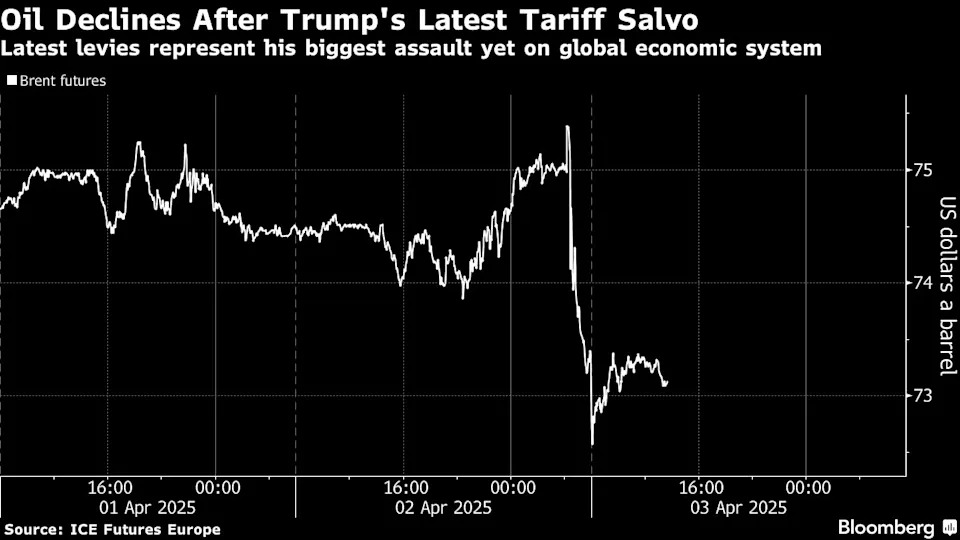Oil Declines as Trump’s Wide-Ranging Tariffs Threaten Demand
(Bloomberg) — Oil fell after US President Donald Trump rolled out stiff tariffs on major trading partners, including China and the European Union, that spared energy but ratcheted up a trade war that threatens global demand.
Brent crude ( BZ=F ) declined as much as 3.2% to $72.52 a barrel, tracking a slump in wider markets. West Texas Intermediate was below $70. The latest salvo of levies represents Trump’s biggest assault yet on a global economic system he has long bemoaned as unfair, and comes after earlier rounds of tariffs against countries including Canada, Mexico and China.
Beijing on Thursday vowed countermeasures against the US, although without giving details. The European Union also promised to respond.
Oil, natural gas and energy products are among exempted goods, the White House said, sparing the direct impact on fuel markets.
Trump said he will apply a minimum 10% tariff on all exporters to the US and impose additional duties on around 60 nations with the largest trade imbalances with the US. Canada and Mexico — key sources of crude for refiners in the Midwest and Gulf Coast — aren’t subject to the latest fees for now.
China was hit with an additional 34% tariff, on top of existing taxes, while the European Union was struck with a 20% levy. The baseline import rates will take effect after midnight Saturday and the higher duties will kick in on April 9.

“The combined 54% tariff on Chinese exports is brutal,” said Robert Rennie, head of commodity and carbon research for Westpac Banking Corp. “It’s hard not to see early estimates of overall weighted average tariff rates of 29% as being deeply growth negative, and thus bad for crude demand expectations in the months ahead.”
The move makes good on months of promises from Trump, who has embraced tariffs as a tool for asserting US power, rebalancing trade relationships, reviving American manufacturing and exacting geopolitical concessions.
Crude has been whipsawed by Trump’s deluge of policy changes, tariffs and sanctions. The latest levies on imports vie with bullishness from tighter US restrictions on Russia and Iran, as well as OPEC+ reining in members that are producing above quota levels.
The discount of Canadian heavy oil to WTI shrank to its narrowest since 2020 thanks to its exemption, while overall negative sentiment weighed on key refined product markets. Benchmark gasoline futures in the US dropped about 4%, with gauges of profits for making fuels from crude also broadly lower.
Markets are also busier than usual, with volumes far above typical levels in the Asian session for contracts across the curve for both global benchmark Brent and WTI.
To get Bloomberg’s Energy Daily newsletter in your inbox, click here.

